Council Elections
Voting for the Mayor and six Councillors for Queensland local governments will take place on Saturday 16 March 2024. Election results will be available from the Electoral Commission Queensland including SBRC electoral divisions.
Local government elections are held every four (4) years on the last Saturday in March, unless changed by regulation. The Electoral Commission of Queensland is an independent and impartial organisation established under the Electoral Act 1992 to administer the Local Government Elections.
There are 77 local council areas within Queensland. South Burnett is a divided council which means voting is separated into divisions and voters elect a councillor to represent their division. All voters elect the mayor for the region.
For all information regarding local government elections including checking your enrolment, enrol to vote or update your details, contact Electoral Commission Queensland (ECQ) website phone 1300 881 665 (Monday – Friday, 9am – 5pm).
All enquiries for the upcoming Local Government Election should be directed to ECQ
-
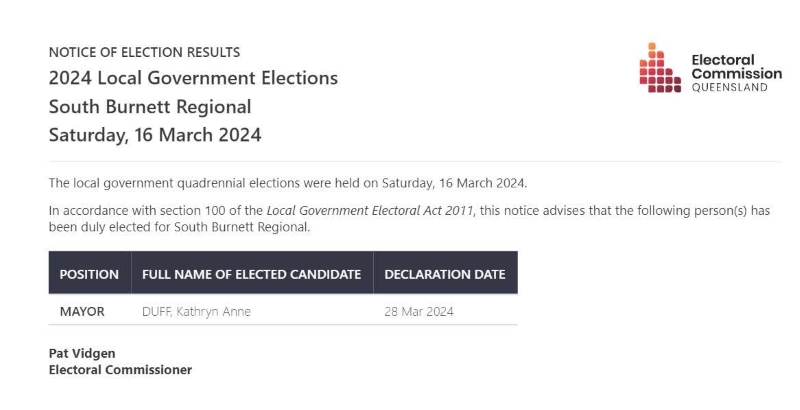
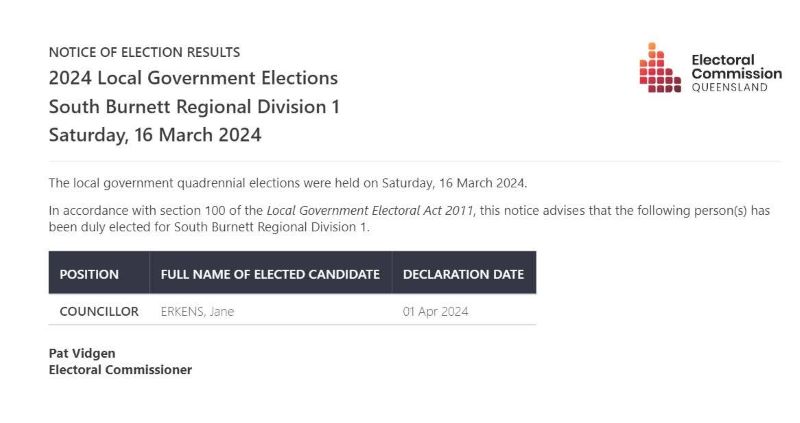
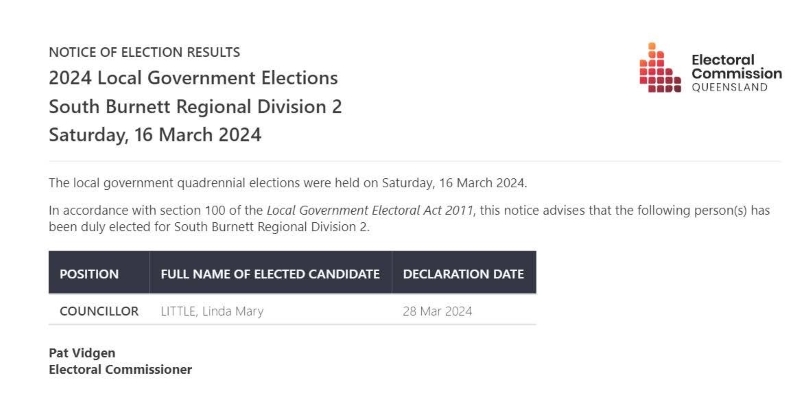
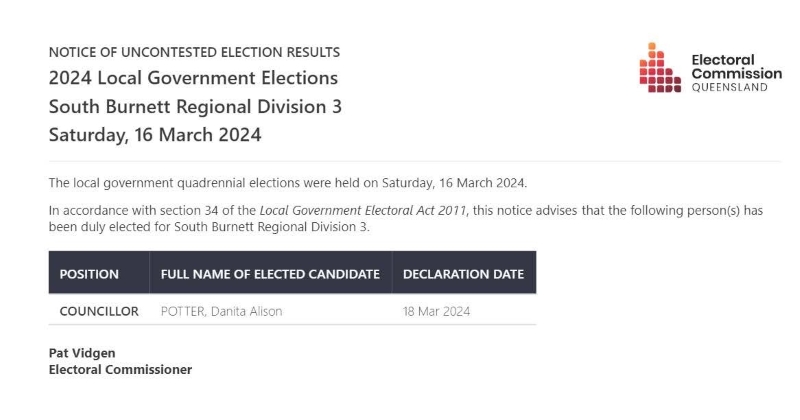
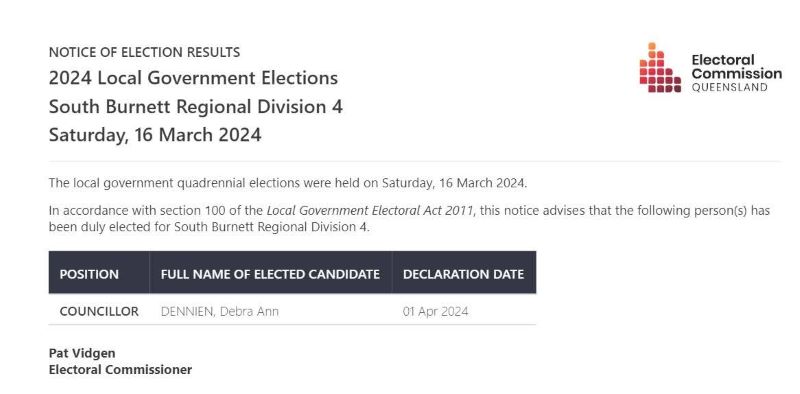
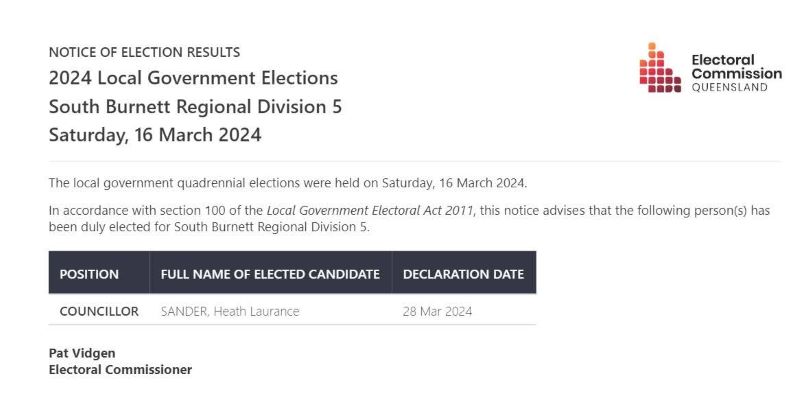
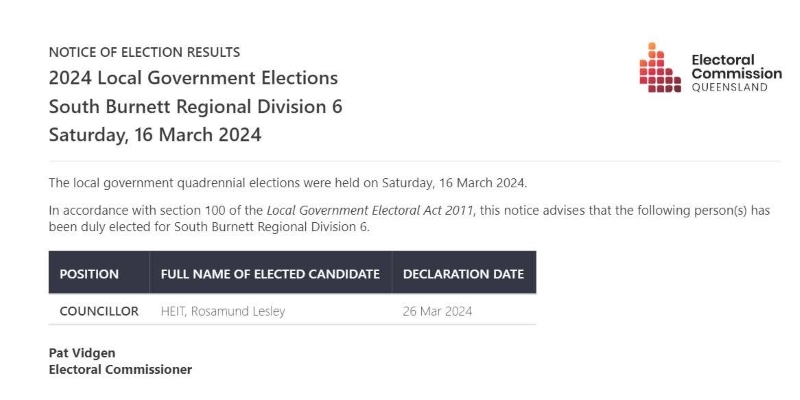
-

-
Council will enter a caretaker period prior to the next local government election. The caretaker period for a local government starts on the day when public notice of the holding of the election is given and ends at the conclusion of the election. During this time, certain restrictions shall apply to Council, Councillors and Council officers to ensure the ordinary business of Council continues in a responsible, transparent and legally compliant manner in the period leading up to an election.
The Electoral Commission of Queensland will advise when the caretaker period commences and when it will conclude for each local government. For more information, visit the Department of Local Government, Racing and Multicultural Affairs (DLGRMA) website.
-
To confirm your Division for the upcoming South Burnett Regional Council 2024 Local Government Elections, you can use the interactive map (final and existing divisions as at 02/08/19) on the Electoral Commission Website or download the maps below:
-
By becoming a councillor, or even just running for election, you can make a positive difference to your local community. Queensland’s councils need councillors and mayors that reflect the diversity of our communities.
Recent local government reforms included the mandatory requirement for training to be completed by all candidates (including existing councillors).
If you intend to nominate for the local government elections, complete the training early so you are well informed about your obligations.
About the training
The training takes around one hour to complete online and contains two modules covering the obligations of candidates and councillors. Topics covered include:
- campaign funding and expenditure;
- election nominations;
- councillor responsibilities; and
- meeting conduct.
Once you have completed the training, you will receive an email with a completion certificate. Keep a copy of the certificate for your records and for when nominations open.
Anyone can complete the free training, including anyone still considering whether they will nominate or members of the community who would like to know more about the role of a councillor and their obligations.
Visit the Queensland Government 2024 local government elections page to find out more about the role of a councillor, what councils do, and what you need to know if you want to stand for election in 2024.
-
Local governments have a responsibility to provide particular services to the community. Other services are the responsibility of the state and federal governments. Both the federal and state governments fund local governments to provide services. Councils may also gain revenue from rates and charges. The responsibilities of the federal government are established under the Australian Constitution.
Responsibilities of local government include:
- town and land planning
- building approvals
- provision of local roads
- water and sewerage services
- animal control services.
Local government legislation
Councils operate under many pieces of legislation. The primary legislation is the Local Government Act 2009 (LGA) and the Local Government Regulation 2012 (LGR).
-
Councillors are elected to govern the Council for the benefit of the local community. A Council puts in place systems and processes to control and monitor — or govern — the Council. Governance is not the same as management. Councillors do not manage the Council; the CEO does this. Management ensures the day-to-day operations of the Council are carried out within the framework of policies and strategic guidelines the councillors have established.
Councillors provide leadership even though they cannot, under the legislation, direct Council staff. They do this by modelling appropriate behaviors and setting appropriate strategic priorities.
Councillors’ essential functions
Councillors are responsible for two broad areas of performance and compliance. This requires that Councillors perform the following essential functions:
- Strategic direction — participate with management in setting policies, goals, strategies and performance targets for the organisation to meet both legislative and community expectations.
- Resources — make available to management the resources to achieve the strategic plan — the money, management, manpower and materials, the CEO’s appointment and a succession plan.
- Performance — monitor the organisation’s performance against its strategies and targets.
- Compliance — ensure management has adequate processes in place to comply with legal and accounting requirements.
- Risk — ensure management has identified risks to which the organisation is exposed and suitable processes are in place to manage those risks.
- Accountability to stakeholders — report progress to stakeholders, especially the electorate as their appointed representatives, and align the collective interests of community, Council, management and employees.
Councillors’ duties and responsibilities
Councillors have duties under the Local Government Act and duties arising from the organisation’s activities. Duties are not owed to any particular group of community members, but to the community as a whole.
Fiduciary duties
To discharge this duty a government is required to act in good faith on behalf of the community and not to benefit from its elected role. Conflicts of interest are the most likely triggers of a claim under fiduciary duty law. This is closely followed by negligence.
General duties
These duties are similar to those applied to directors of commercial corporations but may have harsher penalties if a breach is proven. The duties include:
- duty to act honestly
- duty to act with due diligence
- duty to safeguard information
- duty not to misuse position.
-
Council is superintending the placement of election Signage regulations on all roads being Local and State Controlled Roadways within the South Burnett Regional Council (SBRC) (‘Council’) Area.
An election sign may only be exhibited in a manner that does not adversely impact on local amenity or cause a risk to public safety. Candidates must apply for a permit to erect election campaign signage as per Subordinate Local Law 1.4.
Election Signage is covered by two separate policies/guidelines. Please see below for further detail.
View Council's Local Law 4 - Local government controlled areas, facilities and roads
Download Council's Election Signage Fact Sheet (PDF)
Download Council's Election Signage Notice - Application Form (PDF)
Download Council's Footpath Usage Application for Electoral Signage and Guidelines
-
- Electoral Commission Queensland for information for candidates including election signs.
- Department of State Development, Infrastructure, Local Government and Planning for information about local government categories and Councillor remuneration.
- Community Guide to Local Government in Queensland
- Office of the Independent Assessor
- Local Government Association of Queensland
- Queensland Integrity Commissioner
- Relevent Leglislation in force
Useful Council Documents

